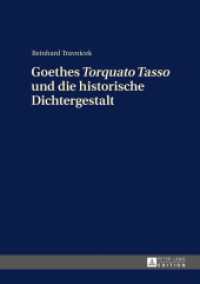- ホーム
- > 洋書
- > ドイツ書
- > Humanities, Arts & Music
- > History
- > general surveys & lexicons
Full Description
This volume addresses the ways the 'native labour' question in the Portuguese late colonial empire in Africa became a recurrent topic of international and transnational debate and regulation after the Second World War. As other European colonial empires were tentatively transforming their labour and social policies in the aftermath of the war, the Portuguese Empire in Africa resisted significant changes in this domain, preserving a strict dual labour regime. As a result, a growing number of individuals, networks and institutions abroad engaged with labour and social realities in Portuguese African colonies, giving origin to a series of instances of denunciation of labour-related abuses. Portuguese authorities responded to these initiatives by selectively engaging with international norms, languages and mechanisms. However, as global decolonisation gained momentum, international and transnational events and processes would significantly constrain Portuguese imperial and colonial decision-making procedures, with the aim of retaining the empire. Therefore, the 'native labour' question became in its own right a crucial political and diplomatic element of the broader struggles over the meaning of Portuguese imperial legitimacy. As this volume argues, these historical processes are critical to properly understanding the history of Portuguese late colonialism and its protracted trajectory of decolonisation.
Contents
Chapter 1: Introduction.- Chapter 2: The Reconfiguration of International Standards and Portuguese "Native Labour" Policies.- Chapter 3: The End of the "Happy Times": The Renewed Internationalisation of Debates on Labour Freedom.- Chapter 4: A Long and Troubled Process: The Ratification of the 1930 Forced Labour Convention.- Chapter 5 - Portuguese Colonialism and the Expansion of the Internationalisation of the "Native Labour" Question.- Chapter 6: Ghana's Complaint against the Portuguese Empire at the ILO (1961-1962).- Chapter 7: Conclusion.






